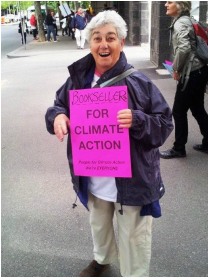Sheila arrived within days of Wendy succumbing to cancer. The news of a vacancy had spread quickly. This was the 60s, a terrace house in North Carlton where my mother had an open door policy towards the homeless. They were always fed and provided there was room, allowed to stay. There were three rules – an initial health check, and a strict ban on sex and babies. Otherwise it was a life of trust, regular feeds, a warm bed and unconditional love.
Sheila was not affectionate. Right from the beginning, she ignored us, as well as Peter and Mary, the other two residents, and kept mostly to herself. Until Paul came.
There was none of the initial uncertainty with Paul, none of the hanging round the house accepting the odd feed, moving away quickly and then returning, before eventually overcoming that ingrained shyness to move in permanently. Paul simply made his way through the open door and demanded food. He was old, tough and derelict, but above all, a survivor. Sheila, despite the huge age difference, was instantly smitten. And age wasn’t the only difference. Sheila was beautiful, with thick black hair, her movements elegant and sinuous. Paul was stocky, nondescript and old, but with a tough guy masculinity about him.
She followed him everywhere, snuggled up to him when he slept, which was long and often; shared her food with him and protected him from Peter’s bullying. And whenever Paul decided to walk around the neighbourhood, Sheila accompanied him, convinced that he would either be run over, kidnapped or lost.
Paul was neither flattered nor irritated by this attention. He’d had a hard life, and had finally achieved his dream, which included safety from the authorities, always on the lookout for vagrants. Love was an optional extra, ours and hers.
One day I came home to be greeted at the gate by an hysterical Sheila. She rushed up to me, bumped against my legs and ran under the house, to then come running back out again. In and out, in and out, all the time howling. There was a sense of urgency about her and it was clear she wanted my help. I changed and followed her under the house.
Paul was dead. He’d found a safe place to die. We’d had him for six years. Sheila was inconsolable. For four days she kept vigil where Paul had died, refusing all food or any attempt to coax her out. Frequently there were gut wrenching cries. When she finally emerged it was to attack Peter, as though he were responsible for Paul’s death.
From North Carlton, to Brunswick, to Shepparton, to Caniambo and finally to St. James, Sheila moved with me. I was 14 when she was dumped in our back yard as a kitten, 36 when she died. Over the 22 years we shared our life, my heart was frequently broken, but never with the intensity and despair that Sheila felt when Paul died.
Sheila was not affectionate. Right from the beginning, she ignored us, as well as Peter and Mary, the other two residents, and kept mostly to herself. Until Paul came.
There was none of the initial uncertainty with Paul, none of the hanging round the house accepting the odd feed, moving away quickly and then returning, before eventually overcoming that ingrained shyness to move in permanently. Paul simply made his way through the open door and demanded food. He was old, tough and derelict, but above all, a survivor. Sheila, despite the huge age difference, was instantly smitten. And age wasn’t the only difference. Sheila was beautiful, with thick black hair, her movements elegant and sinuous. Paul was stocky, nondescript and old, but with a tough guy masculinity about him.
She followed him everywhere, snuggled up to him when he slept, which was long and often; shared her food with him and protected him from Peter’s bullying. And whenever Paul decided to walk around the neighbourhood, Sheila accompanied him, convinced that he would either be run over, kidnapped or lost.
Paul was neither flattered nor irritated by this attention. He’d had a hard life, and had finally achieved his dream, which included safety from the authorities, always on the lookout for vagrants. Love was an optional extra, ours and hers.
One day I came home to be greeted at the gate by an hysterical Sheila. She rushed up to me, bumped against my legs and ran under the house, to then come running back out again. In and out, in and out, all the time howling. There was a sense of urgency about her and it was clear she wanted my help. I changed and followed her under the house.
Paul was dead. He’d found a safe place to die. We’d had him for six years. Sheila was inconsolable. For four days she kept vigil where Paul had died, refusing all food or any attempt to coax her out. Frequently there were gut wrenching cries. When she finally emerged it was to attack Peter, as though he were responsible for Paul’s death.
From North Carlton, to Brunswick, to Shepparton, to Caniambo and finally to St. James, Sheila moved with me. I was 14 when she was dumped in our back yard as a kitten, 36 when she died. Over the 22 years we shared our life, my heart was frequently broken, but never with the intensity and despair that Sheila felt when Paul died.


 RSS Feed
RSS Feed
